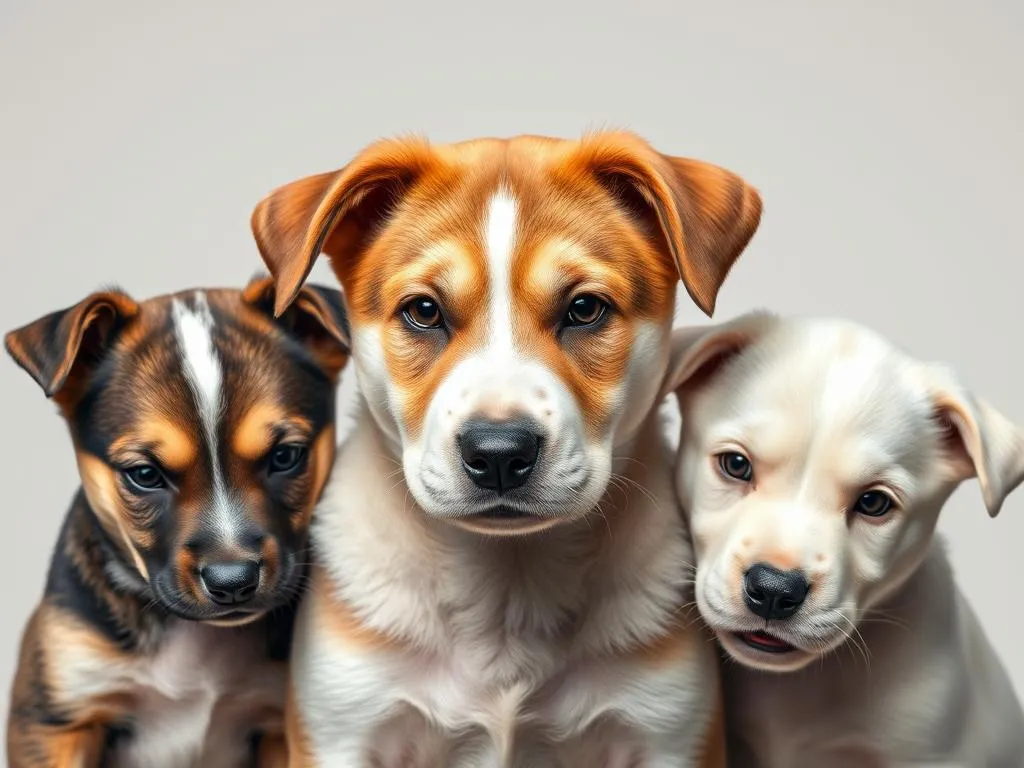
Understanding canine behavior can be a fascinating journey, often filled with questions and curiosity. Among dog owners, one common question arises: do male dogs know their puppies? This inquiry delves into the complexities of canine parental roles and the nuances of dog behavior.
While many assume that male dogs are indifferent to their puppies, the reality is often more intricate. This article explores whether male dogs recognize their puppies through scientific insights and behavioral observations, shedding light on their role in the family dynamic.
Understanding Canine Parental Roles
The Role of Female Dogs
Female dogs, or bitches, exhibit strong maternal instincts. From the moment of birth, they engage in nurturing behaviors that are crucial for the survival and development of their puppies.
-
Nursing and Caring for Puppies: Female dogs provide essential care through nursing, ensuring that their young receive vital nutrients. They also clean their puppies, which helps stimulate their bodily functions.
-
Socialization and Training: Beyond physical care, female dogs play a pivotal role in socializing their puppies. They teach them important behaviors through play and correction, crucial for their development into well-adjusted adults.
The Role of Male Dogs
Traditionally, male dogs have been viewed as less involved in the nurturing of puppies. However, this perception is gradually changing as we learn more about canine behavior.
-
Differences Between Breeds in Paternal Behavior: Some breeds exhibit more nurturing traits than others. For example, breeds known for their strong social instincts may display more interest in their puppies.
-
Impact of Social Structure in Dog Packs: In a natural pack setting, male dogs can exhibit protective behaviors toward all pack members, including puppies. This reflects their role in ensuring the safety and well-being of the group.
The Science Behind Canine Recognition
Sensory Perception in Dogs
Dogs possess extraordinary sensory abilities that play a significant role in their interactions.
-
Overview of Dogs’ Senses: Dogs rely heavily on their sense of smell, which is far superior to that of humans. They also use their sight and hearing, although these senses are not as developed as their olfactory capabilities.
-
How Dogs Identify Their Offspring Through Scent: Research suggests that dogs can identify their puppies primarily through scent. Pheromones, which are chemical signals, play a crucial role in this recognition process.
Studies on Canine Recognition
Several studies have investigated whether male dogs know their puppies.
-
Evidence Supporting or Contradicting Recognition: Some studies indicate that male dogs can recognize their offspring through scent and visual cues. Others suggest that the recognition may be less pronounced compared to female dogs.
-
Case Studies and Anecdotal Evidence: Dog owners often report that their male dogs exhibit protective behaviors towards their puppies, showcasing a level of recognition and attachment.
Factors Influencing Recognition
Genetic Factors
Genetics can significantly influence a dog’s behavior.
-
Influence of Breed on Maternal and Paternal Instincts: Certain breeds are more predisposed to nurturing behaviors, impacting how male dogs interact with their puppies.
-
Genetic Predispositions to Nurturing Behaviors: Studies suggest that the genetics of a dog can dictate various behavioral traits, including those related to parenting.
Environmental Factors
The environment in which a dog is raised can also affect recognition.
-
Socialization During Early Weeks: Puppies that are socialized properly during their early weeks are more likely to bond with their parents, including male dogs.
-
Impact of Separation on Recognition: If a male dog is separated from his puppies for a significant time, this can hinder recognition. Familiarity plays a crucial role in bonding.
-
Influence of the Living Environment on Behavior: A stable and positive living environment can enhance a male dog’s interactions with his puppies, fostering positive recognition and bonding.
Behavioral Conditioning
A dog’s behavior is often shaped by experiences.
-
Training and Social Interactions: Male dogs that undergo proper training and socialization tend to exhibit more nurturing behaviors.
-
How Early Experiences Shape Recognition Abilities: Early positive interactions with puppies can lead to stronger recognition and bonding later on.
-
Influence of the Owner’s Role: Owners play a significant role in shaping their dog’s behavior through training and socialization efforts.
Male Dog Behavior Towards Puppies
Observational Behavior
Observing a male dog’s behavior towards puppies can provide insights into their recognition abilities.
-
Signs That Male Dogs Recognize Their Puppies: Common signs include gentle play, protective behavior, and a tendency to stay close to the puppies.
-
Typical Behaviors Exhibited Towards Young Dogs: Male dogs may display curiosity and affection, often engaging in play that helps socialize the puppies.
-
Differences in Behavior Compared to Female Dogs: While female dogs often exhibit more nurturing behaviors, male dogs can show a unique protective instinct.
Interaction Patterns
Interactions between male dogs and their puppies can vary significantly.
-
Play Behavior and Bonding Activities: Male dogs may engage in playful behavior, which is crucial for social development.
-
Protective Instincts and Guarding Behaviors: Male dogs often exhibit protective behaviors, such as guarding the puppies from perceived threats.
-
Differences in Nurturing Between Male and Female Dogs: While females may focus on direct care, males might engage in more playful interactions that still contribute to the puppies’ overall development.
Common Misconceptions
Myths Surrounding Male Dogs and Parenting
Several misconceptions about male dogs and their relationship with puppies persist.
-
Addressing the Belief That Male Dogs Are Indifferent: Many people believe that male dogs do not care for their puppies; however, evidence suggests otherwise, as they can display strong protective and affectionate behaviors.
-
Clarifying the Role of Male Dogs in Upbringing: Male dogs can play a significant role in the upbringing of puppies, particularly in socialization and protection.
-
Cultural Perceptions vs. Scientific Realities: Society often depicts male dogs as aloof, but scientific observations show that many male dogs actively engage with their offspring.
Impact of Neutering on Behavior
Neutering can alter a dog’s behavior in various ways.
-
Overview of How Neutering Affects Male Dog Behavior: Neutering can reduce aggressive tendencies but may also affect nurturing behaviors.
-
Misconceptions About Neutered Males and Their Parental Instincts: Some believe that neutered males are entirely indifferent to puppies, but many still demonstrate recognition and affection.
Practical Tips for Dog Owners
Encouraging Positive Interactions
Fostering a positive relationship between male dogs and their puppies requires intentional efforts.
-
How to Help Male Dogs Bond with Their Puppies: Gradual introductions and supervised interactions can help male dogs adjust to having puppies around.
-
Techniques for Fostering Nurturing Behavior: Encouraging play and interaction through toys and games can enhance bonding.
-
Importance of Supervision and Safe Environments: Always supervise interactions to ensure the safety of both puppies and adult dogs.
Understanding Individual Dog Behavior
Recognizing that each dog is unique is crucial for fostering positive relationships.
-
Recognizing Personality Differences in Dogs: Some male dogs may be naturally more nurturing, while others may take longer to adjust to the presence of puppies.
-
Tips for Assessing a Dog’s Comfort Level with Puppies: Observing body language can help determine whether a male dog is comfortable interacting with puppies.
-
When to Seek Professional Advice: If behaviors seem concerning or if there are difficulties in interactions, consulting a professional dog trainer or behaviorist can be beneficial.
Conclusion
The question of whether male dogs know their puppies encompasses a rich tapestry of canine behavior and biology. While female dogs typically take on the primary nurturing role, male dogs can also show recognition and protective instincts towards their offspring. Understanding these dynamics can enhance the relationship between male dogs and their puppies, fostering a nurturing environment that benefits all.
Observing these interactions can be a rewarding experience, offering insights into the remarkable world of canine behavior. As dog owners, nurturing these relationships while understanding individual behaviors can lead to a harmonious household filled with love and companionship.









